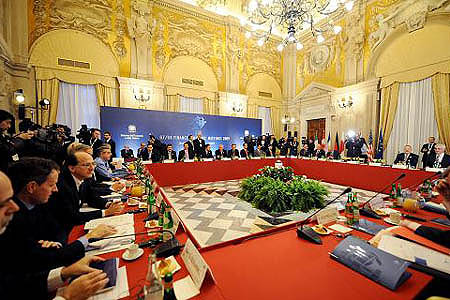|

Finance Ministers and Central Bank Governors meeting in Rome, Saturday, Feb. 14, 2009. Officials from the leading industrial nations will discuss new financial markets rules, concerns about protectionist measures in stimulus plans, and the effect of the crisis on poorer countries. (Xinhua/AFP Photo)
The Group of Seven (G7) finance ministers and central bank governors met in Rome on Friday and Saturday to discuss the global economic down-turn and identify possible solutions to ease the financial crisis.
In a final joint communiqué released Saturday, representatives from the world's leading industrialized nations -- the United States, Germany, Japan, France, Italy, Britain, and Canada -- rejected all sorts of protectionist measures, pledged to sustain employment and economic growth and, at the same time, strengthen the banking system.
The finance ministers and central bank governors stressed they will do all they can to fight recession and avoid distorting free trade.
Italy is hosting the meeting of G7 in its role as rotating president for 2009. The Rome agenda focused on adopting global measures and economic policy reforms capable of stabilizing the world economy and ensuring transparency to allow markets to function correctly.
The message coming from the Rome meeting is very important in allaying fears that governments wanting to protect national jobs and industries would easily abandon the principles of fair competition. The G7 nations want to avoid repeating the errors of the Great Depression, when protectionism was the key-policy.
However, the final communiqué and closing statements of the meeting have not yet erased concerns over what many market experts and financial analysts consider as a contradiction between verbal commitments to free trade and measures that look quite different, like the "Buy American" clause in Washington's stimulus plan and the national car aid plans in France and Italy.
According to the joint agreement, the world is facing its worst financial crisis for 50 years and leading industrialized economies need to cooperate and work together without giving in to protectionism.
The G7 ministers believe that protectionist measures to boost national economies would only threaten world prosperity. The governmental bailouts in Europe and the United States have, in fact, contributed in bettering the financial situation through the injection of liquidity but at the same time have raised concerns over protectionism.
The joint agreement issued from the Rome meeting endorsed the U.S. and British approach to fixing the banking system by recapitalizing banks. In previous days there had been criticism over the American bailout and U.S. President Barack Obama's 787-billion-dollar economic rescue plan focused on public building projects, with conditions including exclusive use of U.S. steel and other U.S.-made goods.
The Rome meeting held a particular significance due to the international debut of new U.S Treasury Secretary Timothy Geithner. He called for all countries to sustain a commitment to "open trade and investment policies which are essential to economic growth and prosperity."
The United Stated also urged "exceptional measures" from the partner-countries in order to ease the financial markets' turmoil. The G7 ministers also stressed the need to support developing countries to prevent the world's poorest from being the biggest losers in the financial downturn.
The rich and developing countries must strengthen their cooperation in better regulation and supervision of banks and markets.
In their final agreement, the finance ministers highlighted that "the stabilization of the global economy and financial markets remains our highest priority," adding that the world's seven industrialized countries have already "collectively taken exceptional measures" to tackle the economic downturn.
The World Bank looks with unease at the current situation and at the contradictory statements issued from the Rome meeting.
World Bank President Robert Zoellick, who also attended the meeting, said that national bailouts would only worsen the global crisis, not resolve it.
"In this moment, economic nationalism is neither economic nor nationalistic," Zoellick said, adding "what might be politically correct might be economically incorrect." "The pull of national politics is very sharp but it's clear that the issues we are dealing with don't stop at national borders," the World Bank president said.
The future looks even grimmer. Fresh data from Europe on Friday showed the scale of the economic downturn and Dominique Strauss-Kahn, head of the International Monetary Fund, said the worst had probably still to come.
In the last quarter of 2008, economic output in the euro zone shrank more than any quarter on record and the picture was much the same in the 27 countries of the European Union. All of the large G7 economies contracted in the last quarter of 2008 and even rising stars such as China are slowing down.
The leading industrialized countries promised to write within four months financial regulations with common principles of transparency, in time for July's G8 summit in Sardinia, Italy.
The outcome of Saturday's Rome meeting will first influence, however, the next important meeting taking place on April 2 in London, where the G20 leaders (the G7 nations plus the world's most important developing economies like China and India) will meet to further the talks regarding the international financial outlook. | 